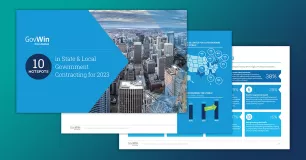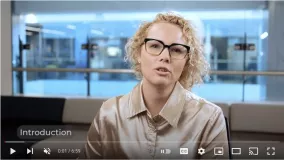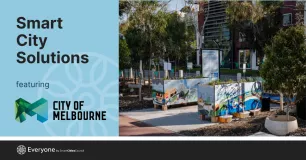
Nashville's Courage Makes It a 2021 Readiness Challenge Winner
The Smart Cities Council has announced that Nashville, Tennessee, USA is one of three (3) Readiness Challenge Winners from 2020 - kick-starting the Council's 2021 Readiness Program. The other two Readiness Challenge winners are
- Brisbane, Queensland, Australia
- Orange County, Florida, USA.
If you are interested in participating in Nashville's collaborative acceleration program in 2021, register here.
Nashville will lead a Readiness Cohort about mitigating the impact of urban flooding on vulnerable populations through the second calendar quarter of 2021 – culminating in a Scoping Charrette (hopefully ‘in-person’) in Nashville with city leaders, participating cities, and solution providers. The overall goal is to accelerate the launch of targeted solutions to mitigate the impact of urban flooding on the city.
Nashville Courage
Nashville was chosen as a Readiness Challenge Winner because of the scope and replicability of its nominated project – mitigating urban flooding (replicability meaning that other cities could learn from Nashville’s work,) – AND most importantly because of courage and resiliency, it exhibited in 2020. Despite a tornado, a pandemic, civil unrest, and a bomb, Nashville persisted in planning for a livable, workable, sustainable Nashville. This took courage and resilience.
In fact, this was an attribute for all our 2020 Winners – Nashville, Orange County, Florida and Brisbane, Queensland, Australia – courage and resilience.
Urban Flooding
The Council had a 2020 planning session with Nashville canceled because of a tornado, COVID 19, and civil unrest – and still, Nashville persisted in its work with the Council attending six (6) planning sessions from October through December 2020 – focused on mitigating the impact of urban flooding. City leaders and staff from Mayor John Cooper, Faye DiMassimo, FAICP (Senior Advisor to Mayor Cooper) Tom Palko (Assistant Director, Metro Nashville Water Services,) Roger Lindsey (Floodplain Manager / Stormwater Design Review at Metro Nashville Water Services,) Jennifer Higgs (Information Technology Services) and Lucy Kempf (Metro Planning) with help from Dr. Janey Camp of Vanderbilt worked hard to address these problems week after week.
Beginning in late fall, Nashville lead a series of collaborative engagements designed to address improving emergency preparedness and planning for Nashville’s long-term recovery. Drawing participants city and statewide, the engagement sessions are helping Nashville to create an actionable plan based on data collection and analysis. At times, we had as many as thirty (30) other cities participating.
A key design element was Nashville's unique 'equity in design' approach. Introduced by Lucy Kemp, Executive Director of Metro Nashville Planning Department, and Faye DiMassimo FAICP, a Senior Advisor to the Mayor, it requires that every project be measured for its efficiency, effectiveness, and accountability in delivering (not just promoting) equitable outcomes for all Nashville residents. See the attachment below for an example of how it was used in developing the Metro Transportation Plan passed in 2020.
You can see Nashville’s work in 2020 here and if you are interested in participating in 2021, register here.
"Cities Helping Cities"
Adding to Nashville's insights were the cities of Charlotte, NC, Cary, NC, Cleveland, OH and Savannah GA. Each of these cities provided insights into the impact of urban flooding and solutions to mitigate the impact. The Department of Homeland Security Science & Technology Divison also presented key research. (Jeff Booth and Dr. David Alexander.) Their work can be found here. With the help of the Council, DHS provided Nashville with lowe cost sensors to test throughout its watershed.
And – a Metro Transportation Plan for 2020
Along with its focus on mitigating the impact of urban flooding, Nashville worked on a massive, metro-wide transportation plan. It culminated in December 2020 , when Nashville Mayor John Cooper proposed a $1.6 Billion Metro Nashville Transportation Plan expanding bus services, increasing mobility infrastructure, investment in bikeways, sidewalks, and greenways – all to reduce traffic throughout the city. According to the proposal, these transportation improvements would mean 92% of Nashville’s population and 94% of Nashville’s workplaces would be located within a half-mile of an improvement.
 Why focus on urban flooding?
Why focus on urban flooding?
Over the last decade, flooding has become an increasingly more serious problem for all cities in the United States and specifically Nashville. Urban flooding causes more damage and kills more people than any other natural disaster in the US. Nashville has a wake-up call in May of 2010 with 20+ inches of rain in two days. Since then it has worked to develop green, built, and data-driven solutions to mitigate flooding. Part of its commitment is to understand the physical and economic damage to its vulnerable communities.
2021 Work
Nashville and the Smart Cities Council are committed in 2021 to continuing their work, with a focus on:
- How do we identify vulnerable populations (beyond CDC Social Vulnerability data)?
- How can we understand and analyze the vulnerable population ‘experience’ of urban flooding in a meaningful way that allows for approaches that mitigates the impact on these populations?
- Are there datasets and analytics that measure the impact of urban flooding on the sense of community, sense of belonging, feeling safe and overall well-being of a community?
- How can we better negotiate ‘buy-outs’ and other economic approaches so they take into account that selling a house is not the same as selling a home. Being uprooted to a new, possibly foreign community may not motivate a potential seller to move from a risky flood situation.
About the Smart Cities Council
The Smart Cities Council, the world's largest smart cities network, envisions a world where digital technology and intelligent design are harnessed to create smart, sustainable cities with high-quality living and high-quality jobs. A leader in smart cities capacity development, the Council is comprised of partners and advisors who have generated $2.7 trillion in annual revenue and contributed to more than 11,000 smart cities projects. Council's programs include:
- A quarterly Readiness Challenge where cities submit a project to qualify for the Readiness Program
- Smart Cities Activator, the only online collaborative planning platform where cities submit their projects, see other city projects, and plan projects
- Smart Cities Academy, the world's premier smart city certification for Smart Cities practitioners with in-depth education
- Smart Cities Chronicles, the world's premier podcast about smart city developments -with speakers from all around the world
- Future of Place - an innovative guide to building future cities, compiled, curated and produced by smart city experts globally.
- Smart Cities Week From Crisis, Opportunity - the world’s premier smart city conference



